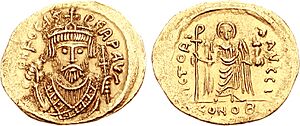Pope Boniface III facts for kids
Quick facts for kids Pope Boniface III |
|
|---|---|
| Bishop of Rome | |
| Church | Catholic Church |
| Papacy began | 19 February 607 |
| Papacy ended | 12 November 607 |
| Predecessor | Sabinian |
| Successor | Boniface IV |
| Personal details | |
| Died | 12 November 607 (aged 67) Rome, Byzantine Empire |
| Other Popes named Boniface | |
Pope Boniface III (Latin: Bonifatius III) was an important leader of the Catholic Church. He was the bishop of Rome, also known as the Pope, for a short time in the year 607. He became Pope on February 19 and passed away on November 12 of the same year. Even though his time as Pope was brief, he made some big changes that helped shape the Church.
Contents
Becoming Pope: Early Life and Work

Boniface III was born in Rome. His father's name was Iohannes Cataadioce. When Boniface was a deacon (a church official), he really impressed Pope Gregory I. Pope Gregory said Boniface was a man with "tried faith and character." This meant he was trustworthy and good.
Because of this, Pope Gregory chose Boniface for a special job. He sent him to Constantinople in 603. Constantinople was the capital city of the Byzantine Empire. Boniface's job there was to be a papal apocrisiarius. This was like being the Pope's personal representative or ambassador. This time in Constantinople was very important for Boniface. It helped him prepare for his future as Pope.
A Diplomat in Constantinople
As the Pope's representative, Boniface became good friends with Emperor Phocas. The Emperor respected him a lot. This friendship became very useful later on.
One time, Pope Gregory asked Boniface to help a bishop named Alcison. Bishop Alcison lived on an island called Corcyra. Another bishop, John, was trying to take over Alcison's church. Bishop John had fled his home because of attacks from the Slavs and Avars. He found safety on Corcyra but then tried to take control from Bishop Alcison.
Normally, this kind of behavior was not allowed. But Emperor Phocas felt sorry for Bishop John. He did not want to get involved. Bishop Alcison asked Pope Gregory for help. Pope Gregory then gave the problem to Boniface to solve. Boniface was very clever and managed to make everyone happy. He solved the problem while still keeping the Emperor's trust.
Boniface III's Time as Pope
Boniface was chosen to become Pope after Pope Sabinian passed away in February 606. However, Boniface's journey back to Rome from Constantinople took almost a year. This long delay before a new Pope took office is called a "sede vacante." People still debate why it took so long.
Some people think Boniface stayed to finish his work in Constantinople. But most historians believe the delay was about politics. There were disagreements in Rome between those who supported Pope Gregory I's ideas and those who did not. It is also thought that Boniface himself wanted to make sure the election was fair. He might have refused to become Pope until he was sure of this.
Making Papal Elections Fair
Pope Boniface III made two very important rules about how future Popes would be chosen.
- First, he made a rule that no one could talk about who the next Pope would be while the current Pope was still alive. If they did, they would be kicked out of the Church. This rule helped stop people from trying to influence elections too early.
- Second, he said that no steps could be taken to choose a new Pope until three days after the old Pope was buried. These rules show that Boniface really wanted papal elections to be free and honest.
The Head of All Churches
Another big thing Boniface did came from his strong friendship with Emperor Phocas. Boniface asked the Emperor for a special order. This order said that "the See of Blessed Peter the Apostle should be the head of all the Churches."
This meant that the title of "universal bishop" belonged only to the Bishop of Rome (the Pope). This rule stopped the leader of the Church in Constantinople, named Patriarch Cyriacus, from trying to call himself "universal bishop." It made it clear that the Pope in Rome was the top leader of the Christian Church.
Pope Boniface III passed away on November 12, 607. He was buried in the old Old St. Peter's Basilica in Rome.
See also
 In Spanish: Bonifacio III para niños
In Spanish: Bonifacio III para niños

